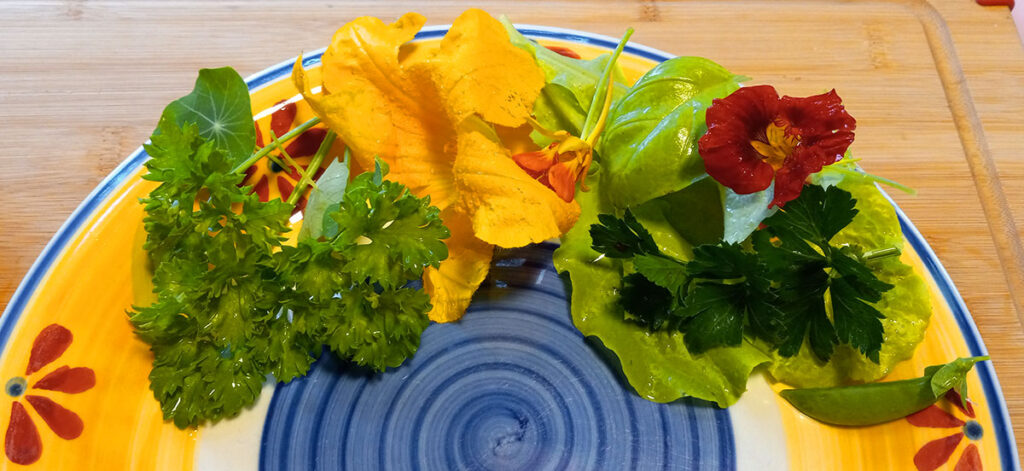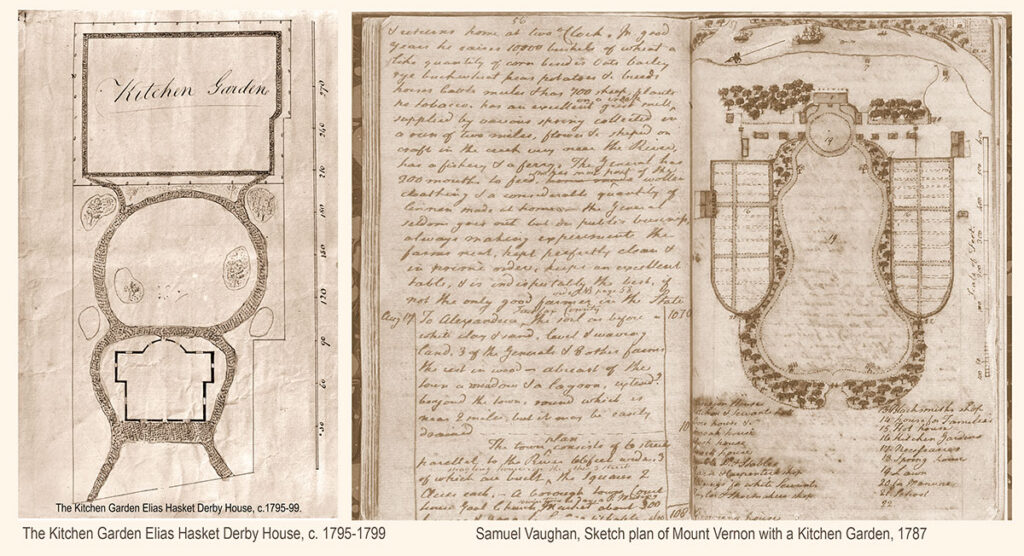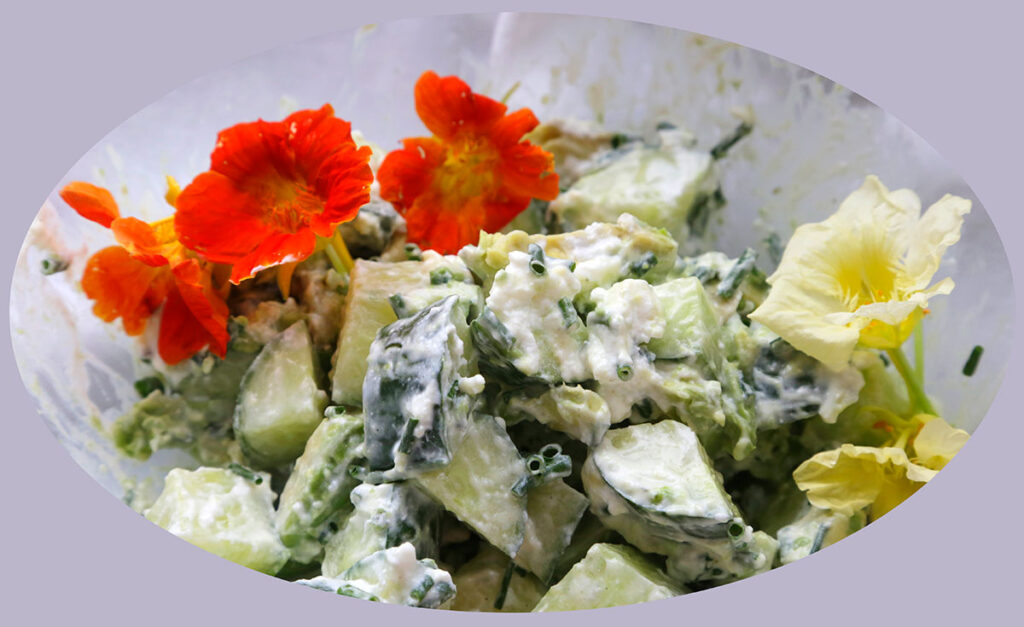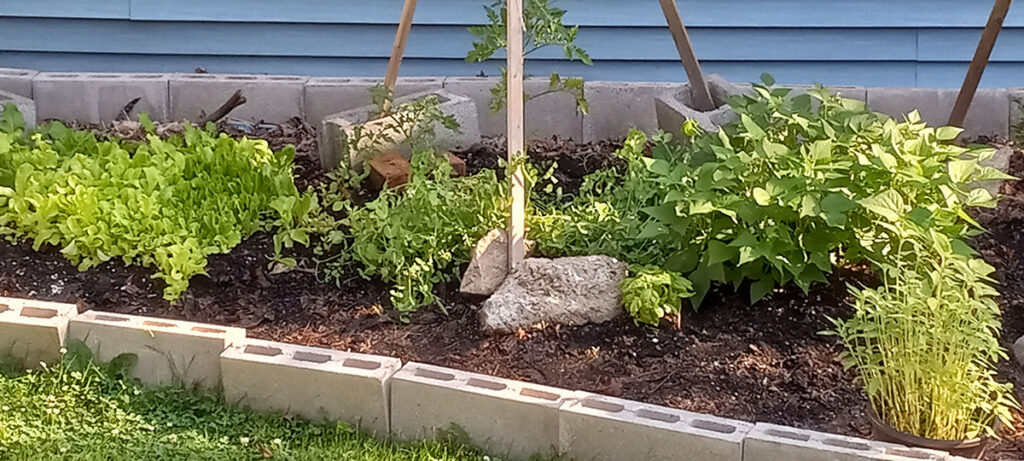If only I could go outside and pick a few sprigs of parsley I mused one day while preparing a meal. Parsley is so good for you. Although it is readily available at the grocery store, sometimes we all run out of this herb or try our best to keep these green sprigs fresh. Such began my journey into planting a kitchen garden.
Well, actually, I had long dreamt of a kitchen garden. But like so many other homemakers busy with family and work, a garden seemed a far-off pastime. While working at Lynde House Museum in its early days, I had the opportunity to help plan such a kitchen garden since there were grounds that could accommodate it. A pioneer, Clarissa Lynde, no doubt had such a garden. She had to feed so many travelers who went by her home in the early 1800s.
My kitchen garden has been a few years in the making and has seen many iterations. Since my backyard space is small, I have had to come up with various gardening methods over the last three years since starting it. However, even just planting a few salad greens and parsley here and there meant I could add a little of this or that to almost every meal during the summer months.
Just this morning, I went out to gather a few things to put on our breakfast-brunch plates.

A Kitchen Garden History
A kitchen garden provided vegetables, herbs, and often fruit for a family’s table. It was a practical necessity for a household’s staple foods. There was no system for transporting fresh produce long distances, as we enjoy today. Many nostalgic sketches and diagrams in old books depict the kitchen garden, which was often hidden away out of sight in favor of larger crops or flower gardens.

Even Benjamin Franklin once wrote that living in Philadelphia meant there were such “well-furnished plentiful markets” that he converted his kitchen garden into grass plots and gravel walks with trees and flowering shrubs rather than for the cultivation of peas and cauliflowers.
“As before I shewed you that the beautie of any worthy house is much the more commended for the pleasant situation of the garden of flowers, or of pleasure, to be in the sight and full prospect of all the chiefe and choisest roomes of the house; so contrariwise, your herbe [or kitchen] garden should bee on the one or other side of the house, and those best and choyse roomes: for the many different sents that arise from the herbes, as Cabbages, Onions, &c. are scarce well pleasing to perfume the lodgings of any house; and the many overtures and breaches as it were of many of the beds thereof, which must necessarily bee, are also as little pleasant to the sight.”
“Paradisi in Sole Paradisus Terrestris,” by John Parkinson, London 1629,
Publ. Humfrey Lownes and Robert Young
As farm gardens became more plentiful, the idea of buying provisions at Farmer’s Markets became more common. The plentiful harvests available today at farm markets and grocery stores are a blessing since relying wholeheartedly on a kitchen garden the size of a balcony or backyard is not sufficient. But stepping outside and picking something fresh is worth the revival of the kitchen garden!
Plan a Kitchen Garden of your own
Here are some ideas to make your kitchen garden a vibrant, delicious paradise:
- The Salad Bar: Imagine a garden bed filled with different types of lettuce, cherry tomatoes, and cucumbers. A fresh salad will be available whenever you want it!
- The Pizza Garden: Basil, oregano, tomatoes, and bell peppers. Plant these, and you’ll be making homemade pizzas so flavorful that your neighbors will be jealous just by the fragrance wafting from your kitchen.
- The Tea Garden: Mint, chamomile, lavender, ginger, rosemary, and lemon balm. Not only will you have a picturesque garden, but when you add a spoonful of honey and boiling water to these herbs, you’ll have a variety of teas ready to sip in the garden’s beauty.
- The Cocktail Garden – Plant some basil, mint, rosemary, and thyme. These are perfect for making refreshing summer cocktails. Remember to have some cute tiny paper umbrellas to pop on the side of your glasses. Guests will be amazed.
- The Rainbow Garden: Red tomatoes, yellow peppers, orange carrots, green beans, and purple eggplants. It’s like a nutritious variety of colors on your plates.
- The Vertical Garden: If you’re short on space, consider a vertical garden. You can grow herbs, lettuce, and even strawberries on a wall or one of the many vertical planters available. Use the best soil, compost, and organic fertilizer, and remember to water them!
- The Edible Flower Garden is one of my favorites, and it is so easy to plant nasturtiums. Other edible flowers are carrot flowers and squash or pumpkin flowers. I don’t have room to grow large enough squash or pumpkins in a tiny garden like mine, but the blossoms are delicious and nutritious! Sometimes, throughout the summer, I can add two of their blossoms to our breakfast plates every morning.

Nasturtiums bloom all summer and fall. They grow in pots or in your garden as a colorful accent. They taste slightly peppery, and you can also eat the smaller leaves. They make a great garnish that is also nutritious. They contain lutein, which is good for eye health.
The image on the left is a chunky cucumber salad with chives, creamy sour cream dressing, and a side of nasturtiums.
Remember, the key to a successful kitchen garden is to grow what you love to eat. And always add a touch of humor and creativity to your garden. You can get some of those fun signs and place them between the pots. Watering, weeding, planting, and saving seeds add delicious additions to your meals, and you soak up much-needed vitamin D and sunshine while bending, carrying, and exercising with a purpose.
Oh, to have a kitchen garden with a row
Of salads, herbs, and veggie delights that grow.
Even just a pot or two
Of tomatoes and nasturtiums too.
Then, I'd gather in the morning's
Dew, a sweet morsel of tender things
And taste the freshest
Kinds of lettuces.
Happy Gardening.




